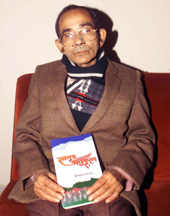 |
Nature?s bounty and social upheavals, narrated using folklore and myth, form the core poetic expression of Hirendra Nath Dutta, the noted Assamese poet and recipient of Sahitya Akademi Award for 2004.
He is among 22 litterateurs selected across India for his collection of poems Manuh Anukale, which consists of 28 lyrical extravaganza. The award, which comprises an engraved copper plaque and a cheque for Rs 50,000, will be presented in New Delhi in February.
?Indeed, I am happy for being showered with the prestigious award and if I deny my happiness that will be simple pretension,? he says.
?But at this point of life nothing can affect me and nor am I waiting to achieve any goal and I feel that the award, along with increasing the list of my readers, has given me a chance to meet people from the cross-section of society and to be a recipient of their tremendous love and affection.?
Besides receiving constant phone calls and the poet is constantly surrounded by his admirers with bouquets at his residence in Guwahati. Manuh Anukale, published in 2000, is the poet?s second book. The book is a mesmerising depiction of humanism and is a lesson of hope for mankind.
?Humanism itself is a very heavily laden term with so many connotations and I have tried hard to be a humanist through my poems in this anthology,? says the poet.
Scholar Hiren Gohain says, ?The present collection Manuh Anukale consists of poems which are a reflection of human sympathy, wisdom, glow and sweetness of love in the widest sense of the term.?
?The poet fights with himself with both faith and doubts and all his poems have intellectual elements along with a touch of personal emotions and thus create refined elements of poetry.?
The 67-year-old poet was born in the tiny hamlet of Titabor in Assam. After finishing his schooling from Mihiram Saikia High School of Titabor, the poet studied science at Cotton College, Guwahati. As a voracious reader of both Indian and Western literature, Dutta slowly and steadily got inclined towards literature.
?I was a serious student and I also engaged myself in extra-curricular activities,? he says.
?I was the secretary of Cotton College Literary Society and we staged plays like Julius Caesar and Arms and the Man and I also acted the female parts in many plays.?
After passing the intermediate exams with flying colours, Dutta studied English from the same college. He then moved to Calcutta to pursue his masters degree in Calcutta University.
?Motivated to crack the Indian Administrative Services examination, I moved to Calcutta to take tuition for the exams and along with that I studied for my post-graduation papers,? he says.
?Although I cleared the mains, I failed to clear the interview. But I passed my post-graduation with fairly good marks and joined the J.B. College of Jorhat as a lecturer in the department of English.?
After working for six months at the college, Dutta joined Gauhati University as a lecturer of English. He not only enjoyed the profession of a teacher but also established himself as a guide for his students.
Dutta began writing poetry in the sixties. By that time he came in close contact with scholars and litterateurs like Prof. Amaresh Dutta, Navakanta Barua and Hiren Gohain.
?During my days as a poet, I did not get a platform for publication but Hiren Gohain helped and encouraged me to carry on with my poetry,? says the poet.
His first collection of poems was published in 1981 under the title Somdhirir Soworini Aru Anaya Anaya Kabita. Many of his poems were published in Assamese magazines like Nilachal Gariyoshi, Prantik. His mettle as a literary critic had been proved much earlier when he started writing for many highly-acclaimed Indian and Western journals and magazines.
I don?t claim to be a scholar of high repute, but I have always endeavoured to be a competent teacher, as the role of a teacher is highly responsible and I never wanted to disappoint the students who reposed extreme trust on me,? feels the educationist.
Speaking about the new authors, the poet says, ?I see a lot of promising in today?s writers.?
?It is a positive sign that the youths are taking part in constructive work. A writer?s pursuits towards creativity shows hopes of betterment of society and unless and until participation towards literary endeavour is encouraged, how can we churn out good work???
He believes that poetry is an art and art is ultimate beauty and it is the moral responsibility of any poet to pursue beauty, nature and its unending mysteries.
?Although I don?t write regularly, please allow me to have the illusion that what I write is exceptionally well,? he bursts out laughing.










